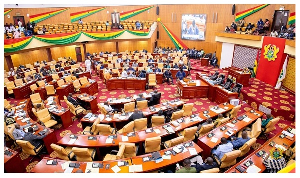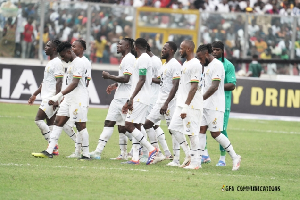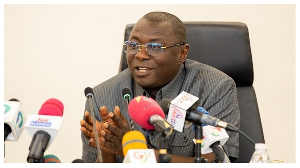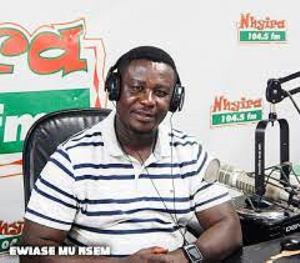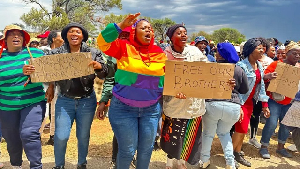* **
Part One: **
**Ghana Shall Not Go To War Over A Disputed Election Anywhere Near The Ivory
Coast! *
Feature Article | by Nana Akyea Mensah, The Odikro.
*Twitter: http://twitter.com/TheOdikro*
"Some of us believe in quiet diplomacy, and that is exactly what we are
doing. There are some who have expressed reservations about the success of
the intended military operation. As a person, I do not think that this
military operation is going to bring peace to La Cote D'Ivoire. Indeed, my
oath to the people of Ghana is to protect our territorial integrity and then
the safety of Ghanaians. So many allegations have been made. Ghana is not
taking sides. My brothers and sisters, it is not for Ghana to choose a
leader for La Cote D'Ivoire. But Ghana should support any measures to
implement the democratic ideals that we all cherish."
- His Excellency President John Evans Atta-Mills, President of the Republic
of Ghana, in an interaction with with editors and media owners at the Osu
Castle Friday, 7 January 2011, to mark the end of his second year in office.
Cats Don't Trust Cat-Hunters
From the above sub-title, it is obvious that the main reason why
"cat-hunters" cannot negotiate with "cats" is basically one of trust. On the
23rd of Dec 2010, senior Ouattara adviser Amadou Coulibaly said of Gbagbo:
“Mice don't trust smiling cats,” So apparently Gbagbo is the cat, and
Alhassan Ouatarra with the support of France, US, UN, ECOWAS is rather the
little mouse. The story gets muddled too fast for my liking, we shall see
the length of this frog only after a rigor mortis or death stiffness! In the
meanwhile we must proceed very gingerly. The field is mined. I can smell war
in my nostrils from the whiffs of lies and systematic distortions in the
corporate media. And as usual, Truth is the first casualty.
First of all, let me make my position very clear from the beginning. Even if
it were completely clear that Alhassan Ouatarra had won the elections and
Gbagbo is simply refusing to step down, it defies all logic to go to war for
such a reason. What compounds and confounds the issue furthermore is that it
is not even clear that Ouatarra really won the elections. The UN was not
sent to the Ivory Coast simply to be fair to both parties in the conflict
there, but to be seen by all to be fair. In my humble estimation they have
failed woefully on both grounds. There are reports of discrepancies even in
their own voter list certifications between the first and the second round
of the Presidential elections. It would have helped a lot if the UN
representative had demonstrated statistically how he arrived at the
conclusion that Ouatarra won the elections, taking into consideration the
number of registered voters, and how he accommodates the thousands of votes
cast that far exceeded the number of registered voters in the North. This
failure of an empirical demonstration made the UN less transparent and
opened the door wide open for all sorts of suspicions to enter into the
fray. I shall dwell extensively on this aspect later in the Part Two of this
article.
Anyway, talking about cats, there is a famous NDC adage which says, "There
are so many ways of killing a cat". It follows therefore that a clever cat
would be circumspect and alert enough to avoid these myriads of traps, if it
is to stay out of harm's way. A desperate Laurent Gbagbo is not going to sit
around idle and accept Ouatarra, France, The US, the UN and the ECOWAS'
Orwellian double-talk of "Your Excellency, this is not a war, it is just a
little military commando operation. We just want to kidnap you a little bit,
please, Mr. President, no bloodshed, sir!' Here is a quote from Toussaint
Alain, Adviser to Laurent Gbago, which shows that Gbagbo is definitely a
very experienced and well-alert cat in the game. "The UN is trying to
manipulate public opinion and is looking for a pretext for a military
intervention,” he is reported to have said.
Just as the cat has the right to be extremely suspicious of cat-hunters,
Gbagbo can only be kidnapped peacefully if we manage to convince him that
this does not amount to a declaration of war. But whether Gbagbo sees it as
a declaration of war or not, is also quite another matter. What the
consequences of such a determination by Gbagbo may mean to you and I and to
over a million Ghanaians living directly in La Cote D'Ivoire, in military
terms is one of the things I am certainly not in a hurry to find out!
War At The Behest Of Our "Development Partners":
This war is clearly not Africa's war. The real war-mongers are hiding behind
the ECOWAS, the AU and the UN. The reason is no different from the same old
boring imperialist interests! I was not in the least surprised to hear the
shrill voice of the Kenyan Premier, Mr. Railla Odinga from far away Kenya,
assuming authority over and above the genuine concerns that Ghana has had
the occasion to air out publicly, perhaps, after silent diplomacy seemed to
have been lost in the decibels of the drums of war that was already beating
at the ECOWAS headquarters at the behest of our "development partners".
Those who do not agree with the president simply fail to appreciate the
implications that we cannot have our own minds about issues intimately
linked to our very security.
The call to follow the ECOWAS bandwagon even if we have the strongest of
reservations, elevates the ECOWAS to be even more important than whether we
live or die. As a convinced Pan-Africanist, I believe that no institution
whose decisions have direct consequences on our lives, has raison d'etre,
with us as members, if the objectives of these organizations have no
connection with our peace of mind, development and social progress.
Following them for the sake of following even at the expense of our lives
and for no justifiable reasons certainly do not form a part of the reasons
why we joined any of these organizations in the first place.
I heard an interview on Myjoyonline, of some so-called "experts" horrified
and declaring that the Professor John Evans Arthur-Mills "goofed" in
breaking ranks with the ECOWAS, the AU, and the UN. Such people should be
ashamed of themselves. For all those who care to follow closely what is
going on, no one was surprised with what the President had to say on this
issue at the recently held "Meet the Press Conference." It has already been
in the news that President Mills did not favour a military solution to the
political impasse in the Ivory Coast. As a front-line state, we ought to
have been actively and vigorously consulted with our voice carefully
weighted. This apparently speaks volumes about what is going on in the
ECOWAS.
Relations With The AU, The UN and The US:
As for the AU and the UN, they are supposed to close ranks with us. We must
definitely know a thing or two about this problem than they could ever
imagine possible, simply because we are the neighbours! Is it not
impertinent on the part of those trying to impose the military option on us,
without our input, even though we are going to bear the brunt of such a
monstrosity? When the US President, Mr. Barak Obama came to Accra, Ghana, he
said:
"It is an honor for me to be in Accra & to speak to the representatives of
the people of Ghana. I am proud that this is my first visit to sub-Saharan
Africa as President of the US. The 21st century will be shaped by what
happens not just in Rome or Moscow or Washington, but by what happens in
Accra as well."
- President Barak H. Obama, Parliament House, Accra, July 11, 2009.
Here is an issue over life and death in which we have our own minds. We
expect people of goodwill and not shady war-mongers to join us in our
obvious eagerness to seek a lasting solution to a problem facing a very
close and important African sister-country. In the absence of the US
consulting us over this and supporting our efforts, the irony here is that
the US is supposed to be angry because they wanted Ghana to think very
differently about the problem in the Ivory Coast! USAfrica even reports:
"Ghana's president John Mills has expressed his opposition to any military
intervention in Ivory Coast, led by the ECOWAS or the international
community, seeking to force controversial incumbent Laurent Gbagbo out of
office... He stated today January 7, 2011 that: ”I do not think the military
operation will bring peace to the nation.” This was a jolt to many of the
leaders of the west African regional bloc, ECOWAS and to the expectations of
the U.S administration of President Barack Obama. Two days earlier, on
January 5, 2011, the U.S Assistant Secretary of State for African affairs
Johnnie Carson had called for increased pressure on Gbagbo with a stronger
demand for him to leave and making the point it is broad fight by the region
for democracy and should not be left as a domestic issue. President Mills is
strongly arguing the opposite position — to the surprise of the U.S and the
international community (supporting opposition candidate Outtarra against
Gbagbo).
Mills who hosted the Obamas on July 11, 2009 in Accra, said today that “It
is not for Ghana to choose a leader for Cote D'ivoire. I have spoken to both
Ouattarra and Gbagbo and I cannot make it public.”
Diplomats, international security experts and interested parties are
wondering: what informed Ghana's blunt and clear position against a forced,
military attack against Gbagbo's outgoing, stalemated presidency?'"
- USAfrica, January 7, 2011.
I am sure the leaders of the world, including the ECOWAS are a little bit
aware of the geography of West Africa, and have taken sufficient notice of
fact that of the only three strong nations capable of mounting a military
challenge to the Ivorian Army in West Africa, Nigeria, Ghana, and Senegal,
only Ghana is a front-line state. If those who are clamouring for war have
any respect for us they would also have come to find out our position on the
matter before beating the war drums and taking us for granted.
What do the Imperialists Want?
I think to understand this very well, we have to go back to "the first time,
the two concepts—'Africa' and 'U.S. national security' were "used in the
same sentence in Pentagon documents". Read carefully what Donald Norland,
former U.S. Ambassador to Chad told a Congressional subcommittee on this for
an explanation from the horse's own mouth:
"In May 2001 the Cheney report warned that the U.S. would grow increasingly
dependent upon foreign oil in the years to come and recommended that as a
matter of policy the Bush Administration work to increase production and
export of oil from regions other than the Middle East, noting that Latin
America and West Africa were likely to be the fasting growing sources of
future U.S. oil imports.[48] Africa supplies about 15% of U.S. oil imports,
but with African production growing at twice the global rate, it could be
supplying the U.S. with as much energy as the Middle East within a
decade.[49] Three months later, Assistant Secretary of State for African
Affairs Walter Kansteiner declared that African oil "has become a national
strategic interest.[50] " This statement is particularly noteworthy in that
it uses the language of the Carter Doctrine in the Middle East, in which
President Carter went on to declare that the U.S. would intervene by any
means necessary to protect its national interest in Middle Eastern oil. In
April 2002, Donald Norland, former U.S. Ambassador to Chad told a
Congressional subcommittee: "It's been reliably reported that, for the first
time, the two concepts—'Africa' and 'U.S. national security'—have been used
in the same sentence in Pentagon documents."[51] Having declared African oil
to be of strategic interest to the United States, the Bush Administration
has not taken the second step to actually apply the Carter Doctrine to
Africa. This has left U.S. policy open to criticism from both sides. The
Council on Foreign Relations Task Force on U.S. policy in Africa has
criticized it for failing "to make a geopolitical shift to pay sufficient
attention to West Africa's energy rich Gulf of Guinea,"[52] while others see
a neo-imperial push unfolding in the sub-region.[53] " - Letitia Lawson,
U.S. Africa Policy Since the Cold War, Strategic Insights, Volume VI, Issue
1 (January 2007) US Naval Postgraduate School.
Ann Talbot writes: "The strike call in Ivory Coast is a cynical manoeuvre,
intended to give Ouattara some semblance of popular legitimacy, while
possibly providing the pretext for a foreign military intervention. If the
strikers came under attack from the Ivorian military, which is still loyal
to Gbagbo, then an invasion by West African troops with French and US
backing could be presented as a humanitarian operation." (See; Ivory Coast
general strike call portends further foreign intervention).
She adds:
"France and the US are eager to see Ouattara in the presidential palace
because they see him as the ideal candidate to push through economic
measures that will make Ivory Coast the key to developing the entire region
as a supplier of raw materials. Their outright backing for Ouattara
represents a shift from their previous preference for a power-sharing
agreement between the northern, mainly Muslim, and the southern, mainly
Christian, Ivorian factions."
Crossed Crocodiles writes: "Although some fear the US State Department
supports Gbagbo, citing particularly Lanny Davis and his close relationship
with the Clintons, Ouattara appears to be the current darling of the US and
France:
“He is a former International Monetary Fund (IMF) economist. He was deputy
managing director of the IMF from 1994 to 1999 and governor of the Bank of
Central African States. He [Ouattara] was prime minister of Ivory Coast from
1990 to 1993 and is closely identified with the free market policies
introduced under an IMF structural adjustment plan that removed price
subsidies and deregulated the labour market. State-owned enterprises were
privatized and tariff barriers removed.
The economic and social tensions that were ultimately to break out into
civil war can be traced in part to the process of economic liberalisation
that began in the 1990s. President Félix Houphouët-Boigny, who ruled Ivory
Coast from its independence in 1960 until his death in 1993, was able to
maintain a degree of stability by sharing patronage among rival sections of
the country's elite. Under his successors tensions became increasingly
acute. Falling commodity prices hit Ivory Coast's chief export of cocoa, and
structural adjustment reduced the amount of patronage available."
We must be extremely wary of being sent into a senseless war for imperialism
in which our nation shall never emerge as a winner but as a loser from the
inevitable blow-backs that such misadventures normally entail. Having
clearly shown to them that the masses of Africa want nothing to do with the
USAfricom Project, they have apparently changed tact. We do not see them,
yet they have their finger-prints all over the place! These busy-bodies want
to turn us into something worse than slaves. They want to use us as cannon
fodders for their greedy economic interests to prosper.
Say "No!" To A Silly Proxy War!
Crossed-Crocodiles writes in"Obama's African Rifles –
Partners/Surrogates/Proxies":
"With the gigantic imbalance between military and civilian spending, and the
huge presence and activity of the Africa Command around the continent, and
the US not doing much else, all African problems as viewed by the US are
likely to be treated like nails requiring a military hammer. With the
present imbalance in military to civilian spending, a military hammer is
about the only tool on offer from the US.
Through its various security assistance programs, the United States now
seeks to build both the capability and willingness of African states to
employ military force throughout the region in a manner that supports US
strategic interests and precludes the requirement for direct US military
intervention. The United States, in effect, is seeking to develop
surrogates."
He continues:
"Maj Shawn T. Cochran wrote Security Assistance, Surrogate Armies, and the
Pursuit of US Interests in Sub-Saharan Africa published in the U.S. Air
University's Strategic Studies Quarterly Spring 2010 v.4 #1 (PDF). He is
quite interesting on the subject of US surrogates and partners in Africa,
and on historic and current US efforts to create and use African
partners/surrogates/proxies.
In the words of a senior US military officer assigned to AFRICOM, the United
States seeks to enhance regional military forces because, “We don't want to
see our guys going in and getting whacked . . . We want Africans to go in.”
One thing he points out early on is: "There is no official DoD definition
for surrogate force, the second key concept. For many, the term proxy may be
more familiar. Within the military realm, the terms proxy and surrogate are
largely interchangeable. The use here of the latter reflects a desire to
establish a degree of distance from the related, yet viscerally more
contentious, concept of proxy war. Given the African experience, any
allusion to proxy war will likely elicit recollections of how external
powers, both in the colonial and Cold War eras, competed by initiating,
escalating, and exploiting local conflicts. Today, many who wish to
denigrate a given foreign policy in Africa simply apply the label “proxy
war” for dramatic effect
I am one of those who uses the label proxy war not just for dramatic effect
but to keep in mind an accurate historic context for viewing current US
military adventurism in Africa.
"… a surrogate force is defined as an organization that serves the needs or
interests of a secondary actor—the sponsor—by employing military power in
place of the sponsor's own forces. Implicit within this definition is the
requirement for the sponsor to fund, equip, train, or otherwise support the
surrogate. The sponsor also must exercise at least some form of control or
influence over the surrogate."
It is deja vu all over again! Are we ready for it this time around?
As Xcroc puts it: "Differences over Ghana's foreign policy caused the US to
engineer and support the coup that overthrew Nkrumah. What new kind of
interference may we be looking at? With whom is the US Africa Command
partnering? US Embassies are actively engaged in spying on African countries
and citizens, collecting:
-- Biographic and biometric data, including health, opinions toward the US,
training history, ethnicity (tribal and/or clan), and language skills of key
and emerging political, military, intelligence, opposition, ethnic,
religious, and business leaders. Data should include email addresses,
telephone and fax numbers, fingerprints, facial images, DNA, and iris
scans.09STATE37561
"
These revelations come from a "directive" sent by the State Department to US
Embassies in Burkina Faso, Cape Verde, Chad, The Gambia, and Mali,
Mauritania, Niger, and Senegal. There is a separate directive indicated also
called "The West African Littoral Directive", which covers the West
Africancoastal countries to the south (Guinea-Bissau, Guinea, Sierra
Leone,
Liberia, Cote d'Ivoire, Ghana, Togo, and Benin. This should throw more light
on what is going on. Unfortunately it has not yet been released by
Wikileaks.
Others include that may throw further light include:
¶C. UN Peace and Peacebuilding Operations.
1) Africa (FPOL-1).
-- Plans and intentions of UN leaders and member states regarding peace
operations, especially in the Democratic Republic of the Congo, Somalia,
Chad/Central African Republic, Burundi, Cote d,Ivoire, and Liberia.
-- UN peacekeeping plans and intentions regarding military operations
against rebels based in the eastern part of the Democratic Republic of the
Congo.
-- Early warning information available to the Secretariat on potential
threats to peace and security.
-- UN views on the role of AFRICOM in African conflict resolution and
post-conflict capacity building.
-- UN expectations of US military involvement in African peacekeeping
missions and how this may influence UN willingness to establish, curb, or
end missions.
-- Extent to which UN peace operations in Africa are straining the resources
of the UN and member states; impact of current operations on future
operations and readiness. -- UN views on peacekeeping mission creep and
pressures to expand the UN role in African conflict zones, either in the
form of more comprehensive "peacemaking" mission mandates or in areas where
security threats demand more aggressive and timely UN-led multilateral
intervention.
-- Details on views of the UN Department of Peacekeeping STATE 00080163 012
OF 024 Operations on operational plans, including the ability of the UN and
its member states to build capacity in Africa, including by working with the
AU or other regional organizations and NGOs.
-- Efforts by China, France, Iran, and others to gain influence in Africa
via UN peace operations.
-- Information on extent of support and capabilities for peace operations by
the AU and the Economic Community of Western African States (ECOWAS). --
Official stance on deploying HIV positive troops and actual practice.
-- Degree to which official peacekeeping reporting matches unofficial
communications of events; views on those discrepancies.
-- Views of African states that host peacekeepers regarding UN peacekeeping
troops and troop contributing countries.
-- Attitudes and intentions of Ghana and Rwanda concerning UN peace
operations in Africa and perception of their relative ability to contribute
to such efforts.
-- Attitudes of other African States to Ghana/Rwanda participation and
leadership.
I am speechless, but Crossed Crocodiles again managed to bring out the
feeling to my satisfaction; "It seems like US foreign policy can be summed
up with a line I heard in a cartoon this week: A friend is just an enemy who
has not attacked yet"!
*Forward Ever! Backwards Never!!!*
*Cheers!*
*Nana Akyea Mensah, The Odikro*
*Give me a follow and let's exchange views on what I call "a grammar of
Pan-Africanism and its manners of articulation in an ever-changing world"!**
*
*E-Mail: nanaakyeamensah@gmail.com*
*Twitter: http://twitter.com/TheOdikro*
Opinions of Tuesday, 11 January 2011
Columnist: Mensah, Nana Akyea






